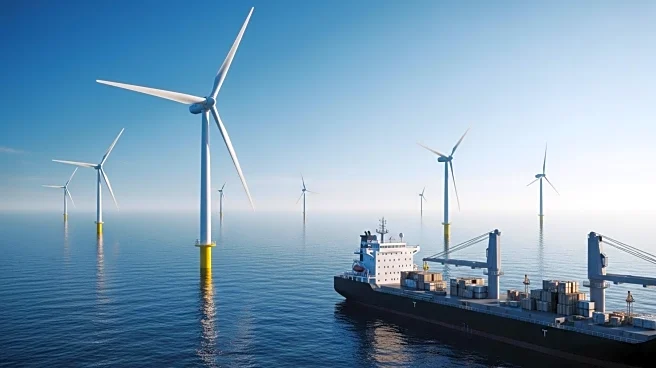What's Happening?
Empire Energy, a firm specializing in offshore wind services, has announced a strategic partnership with logistics giant Kuehne+Nagel. This collaboration aims to provide comprehensive solutions for offshore wind developers and original equipment manufacturers (OEMs). The partnership is designed to streamline the offshore wind project lifecycle, encompassing turbine assembly, commissioning, operations, heavy lift transport, port staging, and international freight forwarding. According to Mike Milledge, President of Empire Energy, the partnership is not just about logistics but also about leadership in executing complex projects with certainty and vision. Felipe Cecilio, Global Project Logistics Solutions Manager at Kuehne+Nagel, emphasized the importance of handling complex supply chains and risk management, highlighting the tailored solutions they can offer to meet customer needs.
Why It's Important?
The partnership between Empire Energy and Kuehne+Nagel is significant as it addresses the growing demand for efficient logistics in the offshore wind sector. As the U.S. and other countries continue to invest in renewable energy, the need for reliable and efficient logistics solutions becomes critical. This collaboration could set a new standard in the industry, potentially reducing costs and risks associated with offshore wind projects. It also highlights the importance of strategic partnerships in achieving large-scale renewable energy goals, which could lead to increased investment and development in the sector. Stakeholders in the renewable energy industry, including developers and OEMs, stand to benefit from improved project delivery and reduced logistical complexities.
What's Next?
The partnership is expected to lead to the development of new logistics solutions tailored to the specific needs of offshore wind projects. As the collaboration progresses, it may attract more stakeholders in the renewable energy sector, potentially leading to further innovations and efficiencies. The success of this partnership could encourage other companies to form similar alliances, fostering a more collaborative approach to tackling the challenges of offshore wind logistics. Additionally, the partnership may influence policy discussions around renewable energy infrastructure and logistics, potentially leading to supportive regulatory frameworks.









